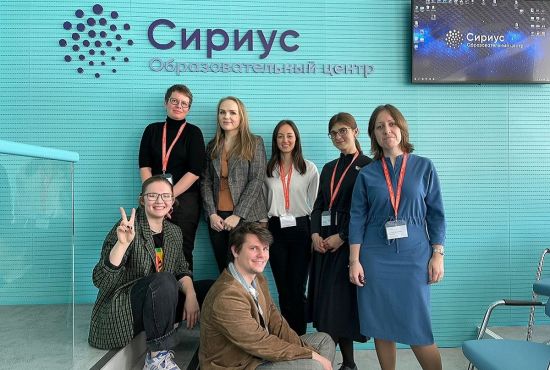Academics from St Petersburg University hold a specialised session on journalism for gifted school students at the Sirius Centre
November 10, 2021
In October, academics from St Petersburg University ran a programme on journalism at the Sirius Educational Centre in Sochi.
Kamilla Nigmatullina, Doctor of Political Science and Head of the Department of Digital Media Communications, headed the programme, while the seminars and master classes were given by academics and graduates of the School of Journalism and Mass Communications of St Petersburg University: Natalia Pavlushkina, Aleksandra Litvinova, Anastasiia Danilova, Nikolai Rodosskii, Liudmila Tsupko and Svetlana Shchelokova. The project week took place with the participation of the students of the University: Anna Mamiako and Anastasiia Filippova. 60 gifted schoolchildren from 31 regions of Russia came for the three-week intensive course.
The programme included several modules: workshops on ‘new nature’ texts; seminars on media texts; and work on media projects. Also, students could attend numerous workshops, lectures and creative meetings. The main objective of the session was professional orientation: students got an idea of how modern media and the media market function; they also learned the skills necessary for a media specialist and enriched their portfolios.
The Sirius Centre is first and foremost an environment that creates conditions to help talents unfold. When the participants came here, they already had a sufficient level of knowledge. So we saw our task as maintaining their verve and sparkle in their eyes.
Kamilla Nigmatullina, Head of the Department of Digital Media Communications
During the workshop, each student worked on a text in their chosen genre. All participants were able to produce high-quality texts. Some of them will be published in the Sirius Educational Centre's almanac, while others – in regional and federal media. 'The Sirius interns are an unusually responsive audience. I was mostly impressed by their courage: even if they don't know something, they will throw in two or three guesses. They eagerly join in any conversation and are not afraid to argue: they do not care about authority. Hence the result: each final text is a vivid, truly individual statement,' said Nikolai Rodosskii, Assistant Professor at St Petersburg University and the moderator of the Literary Review seminar.
The pleasure of teaching and the opportunity to master new formats were noted by all the teachers of the programme. 'Some tasks took shape spontaneously: for example, the beginning of our workshop fell on Nobel week,' stressed the presenter of the Interview workshop, Anastasiia Danilova, Assistant Professor at the University. ‘I decided that it would be strange not to take advantage of such a great event. So during one of the sessions together with the schoolchildren, we devised and refined questions for this year's Nobel laureates. After we developed and edited the questions, the kids drafted their own letters to the laureates, translated them into English and sent in their questions. I think it's a very valuable experience to start a career with some large-scale, ambitious tasks.’
The session dedicated to journalism is the traditional format of the 'Creative Writing' programme. The participants are teenagers who are interested in modern media and whose portfolios already include publications and recommendations from industry experts – editors and journalists. In previous years, the programme was co-organised by the editors of the federal media and professors from the country's largest universities. Several times, professors from St Petersburg University also took part in the journalism programme. However, this year's programme was special because it was implemented in cooperation between two divisions of St Petersburg University – the Institute of Pedagogy and the School of Journalism and Mass Communications.
No comments yet. Be the first!



